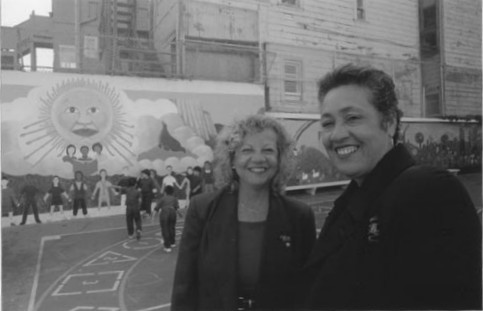Juanita Owens and Rosalinda del Moral
|
Juanita Owens Born July 8, 1946 President, Board of Education San Francisco, California 725,000 constituents |
Career Overview Elected November 1996
|
|
Rosalinda del Moral Born September 6, 1947 Democratic Executive Committee, District 13 San Francisco, California 244,000 constituents |
Career Overview Elected June 1998
|
Juanita Owens worked with the city college for about 30 years as the Dean of Counseling. Del Moral worked as the Director of Parent Relations for the San Francisco Unified School District. They are life partners.
Interview with Juanita Owens and Rosalinda del Moral for Out And Elected in the USA
Q: It’s been quite a year for both of you – lots of personal and professional changes, public controversy, and also some major innovations. Tell me something about it.
A: (Rosalinda) The gay and lesbian mural was an item that is really something. At Mission High School, the first in the nation probably, there is a mural on the wall and it is very large. It is right across from the auditorium and reflects figures throughout history that have made significant contributions in their own right such as literature, the arts, politics, science or sports. It is quite breathtaking.
A: (Juanita) I think personally, as president of the board, and working with the kids and caring about all kids because I represent all the kids of San Francisco, I am also a voice for the gay, lesbian, bisexual and transgender kids.
I’ve been meeting with them, and I brought the Superintendent with me to hear their issues – you know, their experience in school – what is it? And how do they file a complaint when they feel that there is harassment taking place, or slurs, or verbal attacks, or that they have been threatened in some way? What is the policy? There are forms to fill out, but they are not accessible. We talked about making things more visible. We talked about having more open dialogue and discussion around these issues in the schools. I actually brought her to the meetings, and out of those discussions we are forming a student task force or an oversight committee.
They would put the committee together in terms of representation – parents, students, whoever – I would be on the committee, maybe another board member – but it would be up to them, the youth, to make that decision. And so they had a choice of making it a standing committee of the board or a separate oversight-like task force committee where they can work independently. I put out the options, told them the pros and cons, what I thought of both, and they chose the oversight committee versus being a standing committee. A standing committee means individual board members would be able to appoint. They wanted to be able to have the oversight of their own committee, and I really respect that a lot. I’m glad they came to that decision.
We are having a meeting this month and the superintendent I hope is going to be there, or her representative, and then they are going to look at the resolution that was passed in ’96 about the curriculum, about queer youth, health, and other items on the resolution. They are going to review that resolution, they are going to see if we’ve made some accomplishments and what we still need to do, and then probably come forward with a report. I’m excited. Now the youth are involved. For the first time the gay youth, queer youth, will have a committee of the San Francisco Unified School District.
Getting the policy in place, and now the follow-through – and getting staff to follow the policy. Many times we’ve put these policies forward, but there is no follow-through. There is no accountability. And that is what we need to look forward to and that’s where I hope this youth group will come forward to the board and say, “Yes, yes, yes, but there is no oversight, there is no accountability among staff to make sure that these are in place, or that we are incorporated in some way into the curriculum, or that we understand how to move forward on a grievance process, and then who is going to evaluate that grievance.”
All of that needs to be done and I’m hoping that this youth group will be able to work with the staff – and there will be a staff representative as a part of their committee – and that staff will have to go away and see to implementation, and then the board will call for a full report and we can find out whether it is happening or not. I’ve seen resolutions come forward that are very symbolic, but there is no delivery, there is no execution – they sound good and look good politically – but where are we taking it?
My style has always been task-oriented. And any initiative I put into place, I want to make sure that there is absolute follow-through and accountability.
Return to Out and Elected in the USA: 1974-2004 index • Go to next article
For information on a touring exhibit version of Out and Elected in the USA: 1974-2004, contact Ron Schlittler at rlschlittler@verizon.net.
